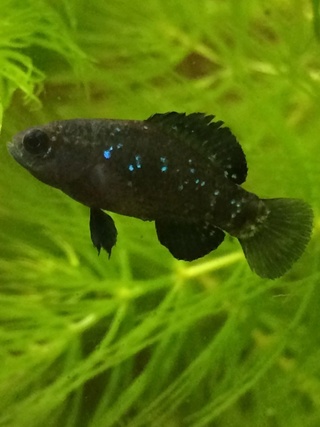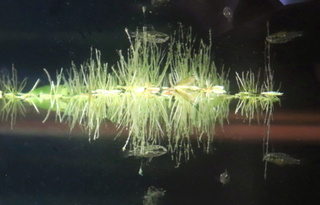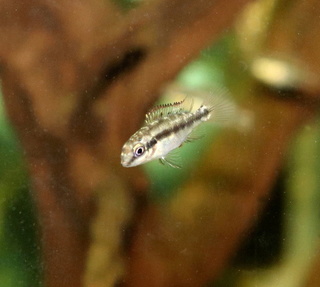Colony breeding for livebearers
5 posters
:: Freshwater :: Freshwater General
Page 1 of 1
 Colony breeding for livebearers
Colony breeding for livebearers
As many of you know I like small livebearers. All of my species are set up as colony breeders where there is only one male amongst the females and juveniles. I select out the best male and let him rule the roost, so to speak. This offers several advantages. The genes of male1 are transmitted to the colony. Other males, held in another tank can be reintroduced or create a collateral colony for later genetic diversity.
Having just started the colonies, I did not want to infuse the entire genetic offering into the population. I thought it best to hold back the remaining males to inject genetic composition at a later time. At some point I will split off the population to create two separate colonies if possible. Or seek another breeder with the same type of fish. However I purposely choose a path to collect difficult to acquire fish, therefore I will need to manage the genetic composition carefully.
Seeing how there are endangered species being kept in aquarists care, I wonder how much attention is being given to strengthening the genetic pool. While there is a tendency to select certain traits and features, this inherently creates a danger of domestication, or forced unnatural speciation. Therefore timing the genetic entry may play a role in managing the population (through the reservation of males). Other strategies may be line breeding, inter colony exchange (other breeders), introduction of wild stock, or perhaps natural entropy.
Any breeders have thoughts on ths ?
Having just started the colonies, I did not want to infuse the entire genetic offering into the population. I thought it best to hold back the remaining males to inject genetic composition at a later time. At some point I will split off the population to create two separate colonies if possible. Or seek another breeder with the same type of fish. However I purposely choose a path to collect difficult to acquire fish, therefore I will need to manage the genetic composition carefully.
Seeing how there are endangered species being kept in aquarists care, I wonder how much attention is being given to strengthening the genetic pool. While there is a tendency to select certain traits and features, this inherently creates a danger of domestication, or forced unnatural speciation. Therefore timing the genetic entry may play a role in managing the population (through the reservation of males). Other strategies may be line breeding, inter colony exchange (other breeders), introduction of wild stock, or perhaps natural entropy.
Any breeders have thoughts on ths ?

alexmtl- Veteran Member

- Posts : 3274
Join date : 2013-09-07
Location : Montreal Quebec
 Re: Colony breeding for livebearers
Re: Colony breeding for livebearers
I haven't done any work trying to "strengthen" the gene pool of my fish. I don't work with many fancy types, and with the wild type live bearers, killifish, cichlids and catfish that I keep, the best I can do is try to maintain mother nature's work.

vince0- Pleco Poster

- Posts : 507
Join date : 2013-09-07
Location : Alberta
 Re: Colony breeding for livebearers
Re: Colony breeding for livebearers
I simply keep a lot of livebearers in as large a tank as I can manage. I go on the principle that studies show the importance of female choice of males in the group, so I give the females choices. If there is an obviously messed up fish, it does not get to breed, but as long as they stay true to wild type, I do no selecting. I figure the females will decide what the desired traits of a dominant male are much better than I can. I may be looking at something they have no interest in, and in so doing, I can start a domestic breeding direction.
It will always happen, to a degree. The tank environment will select.
There were formulas worked out in the killie hobby to lessen the effects of inbreeding, however, they needed about ten tanks per species to be done right, and that is beyond my level of commitment.
In a perfect world, I start a livebearer colony with 4 or more males, and as many or more females. A dozen fish is good. In reality, I often start with a single pair, the male of which may or may not be the father of the first batch of young. My larger group begins with the offspring - not ideal, but what I have to work with.
I've never noticed inbreeding problems though. There can be changes in cancer rates in my montezumae, or in hump size on my birchmanni, and I don't know what is pressuring those selections, but generally, the big group breeds true and effectively. Size, adornment, etc remain the same over generations with my wild-types, as long as I change water and feed carefully.
The longest I've maintained a species for is just 17 years though. That's a blink in time for these fish.
It will always happen, to a degree. The tank environment will select.
There were formulas worked out in the killie hobby to lessen the effects of inbreeding, however, they needed about ten tanks per species to be done right, and that is beyond my level of commitment.
In a perfect world, I start a livebearer colony with 4 or more males, and as many or more females. A dozen fish is good. In reality, I often start with a single pair, the male of which may or may not be the father of the first batch of young. My larger group begins with the offspring - not ideal, but what I have to work with.
I've never noticed inbreeding problems though. There can be changes in cancer rates in my montezumae, or in hump size on my birchmanni, and I don't know what is pressuring those selections, but generally, the big group breeds true and effectively. Size, adornment, etc remain the same over generations with my wild-types, as long as I change water and feed carefully.
The longest I've maintained a species for is just 17 years though. That's a blink in time for these fish.

GaryE- Veteran Member

- Posts : 2505
Join date : 2013-09-07
 Re: Colony breeding for livebearers
Re: Colony breeding for livebearers
Gary, What species is the one that got 17 years of your attention?

ksimdjembe- Angel Fish

- Posts : 369
Join date : 2013-09-08
 Re: Colony breeding for livebearers
Re: Colony breeding for livebearers
A beautiful little blue and red killie named Aphyosemion zygaima. It was a really difficult fish to breed in my water, but I never got tired of seeing their colours. Eventually, I was careless and didn't keep enough young around. I ended up with a single sex batch and no adult breeders, and it was lights out.

GaryE- Veteran Member

- Posts : 2505
Join date : 2013-09-07
 Re: Colony breeding for livebearers
Re: Colony breeding for livebearers
Last night at the MAS Meeting, a question was asked about genetic inbreeding concerns in colony breeding. As always GaryE adroitly handled the question from a intelligent and simple approach. For the store bought fish, which has had numerous iterations of inbreeding to force double recessive genes that would normally never survive in the natural gene pool, inbreeding is a concern, ONLY if the deformity is determined as undesired.
Undesirable traits can be several : ie bloated body, lack of appendages, aesthetically unpleasing, self-limiting as in sterile mules, cancer, short life spans etc. In essence, that which "we" determine is not to standard or to our desire.
Conversely these same undesirable traits can be deemed desirable: domesticated chickens with large breasts to meet the demands of consumers, cows with no horns to reduce the potential for danger, use of mules to minimize pregnancy in a herd, mice that produce cancer in order to us to study the disease, shortened time to maturity so that we can harvest.
We are genetically modifying our animals and fish by inbreeding and not ensuring genetic diversity. Actually, humans have been manufacturing GMO (genetically modified organisms) since early days of herding and we enjoy the by-products of the husbandry in the dogs and cats that we keep, the food we eat, and the clothes that we wear, and the medicines that keep us alive, just a little while longer in the case of cancer. I am in favour of GMOs as a societal benefit.
In colony breeding then, what we must ensure is that the genes remain diverse. If one started with only a pair, then all genes would derive from this gene pool. We know that genetic shift occurs idiosynchratically, therefore a large population would create more chances for genetic diversity. Separation of the colony once large enough, would allow divergence after several generations, and create another genetic reserve.
Colony breeding : split the colony after several generations, unless you are trying to fix the strain. Distribute your genetic pool to other breeders as they in turn will produce a new composition of genetic reserve. If you can introduce a stronger strain with dominant genes in order to mask weak traits (however extreme care and planning must be done to return to the original fixed strain).
Genetic inbreeding is not necessarily a "bad" thing, it is a useful tool to create some of the more beautiful strains of killies, guppies and even snails. Colony breeding (young, juveniles and adults) are a way to manageably keep a large population with tank efficiency, howver we should ensure that the best males are left breed. As males are the more colorful, they become the object of manipulation in most species.
Just a few thoughts...
Undesirable traits can be several : ie bloated body, lack of appendages, aesthetically unpleasing, self-limiting as in sterile mules, cancer, short life spans etc. In essence, that which "we" determine is not to standard or to our desire.
Conversely these same undesirable traits can be deemed desirable: domesticated chickens with large breasts to meet the demands of consumers, cows with no horns to reduce the potential for danger, use of mules to minimize pregnancy in a herd, mice that produce cancer in order to us to study the disease, shortened time to maturity so that we can harvest.
We are genetically modifying our animals and fish by inbreeding and not ensuring genetic diversity. Actually, humans have been manufacturing GMO (genetically modified organisms) since early days of herding and we enjoy the by-products of the husbandry in the dogs and cats that we keep, the food we eat, and the clothes that we wear, and the medicines that keep us alive, just a little while longer in the case of cancer. I am in favour of GMOs as a societal benefit.
In colony breeding then, what we must ensure is that the genes remain diverse. If one started with only a pair, then all genes would derive from this gene pool. We know that genetic shift occurs idiosynchratically, therefore a large population would create more chances for genetic diversity. Separation of the colony once large enough, would allow divergence after several generations, and create another genetic reserve.
Colony breeding : split the colony after several generations, unless you are trying to fix the strain. Distribute your genetic pool to other breeders as they in turn will produce a new composition of genetic reserve. If you can introduce a stronger strain with dominant genes in order to mask weak traits (however extreme care and planning must be done to return to the original fixed strain).
Genetic inbreeding is not necessarily a "bad" thing, it is a useful tool to create some of the more beautiful strains of killies, guppies and even snails. Colony breeding (young, juveniles and adults) are a way to manageably keep a large population with tank efficiency, howver we should ensure that the best males are left breed. As males are the more colorful, they become the object of manipulation in most species.
Just a few thoughts...

alexmtl- Veteran Member

- Posts : 3274
Join date : 2013-09-07
Location : Montreal Quebec
 Re: Colony breeding for livebearers
Re: Colony breeding for livebearers
Alex, I appreciate those thoughts. One thing that we dance around with always stating is that lists like this can be used for better fishkeeping. I sent out a lot of fish through the CAC, and some came back to me. I've had my Z tequila line 'refreshed' twice from other breeders who started with my fish (a weak point) but who ran their lines for a couple of years.
We can't all do this at home. It's our hobby - we want novelty and new experiences, and to dedicate a dozen tanks to one species is too much for a home breeder. Clubs, virtual associations etc can keep diversity as high as is reasonably possible with our captive fish. We can work together on species we all like, exchanging and trying for diversity.
We can't all do this at home. It's our hobby - we want novelty and new experiences, and to dedicate a dozen tanks to one species is too much for a home breeder. Clubs, virtual associations etc can keep diversity as high as is reasonably possible with our captive fish. We can work together on species we all like, exchanging and trying for diversity.

GaryE- Veteran Member

- Posts : 2505
Join date : 2013-09-07
 Re: Colony breeding for livebearers
Re: Colony breeding for livebearers
My immediate reaction is that using only a single male causes instant founder effect, where all the fish in your next generation are related to each other. (Granted, this is coming mostly from reading about the problems of dog breeders, problems with fish show up sooner.) If you are trying to keep genetic diversity, and avoid deleterious recessives, then the more individuals of BOTH genders used the better. If you are trying to breed for a specific trait, using unrelated individuals who all share that trait will help keep a healthy variety of genetics.

ownedbycats- Shrimp

- Posts : 27
Join date : 2013-09-12
Location : Ontario
:: Freshwater :: Freshwater General
Page 1 of 1
Permissions in this forum:
You cannot reply to topics in this forum
 Alexmtl
Alexmtl


» Anyone still around? Need help transporting fish
» Stocking suggestions
» New Tank Purchase
» 3 Gallon Tetra half moon tank
» White floaty stuff in gold fish tank
» Ammonia in tap water
» Need advice for beginner with fresh water tank
» Fluval FX5 hose size?
» smart fish, dumb fish, pink fish...um, what rhymes with dumb?
» Is K&E sandblasting sand same as Black diamond?
» What the...is that a leak? NOOOOOOOOOOO!!!!! (a comedy of horrors...)
» Air stones and the noise they make
» aquatic medications
» film like stuff on the water surface of shark tank
» Articles on swordtail behaviour and fathead minnows
» Lets see your predators!
» Humane way to PTS a shark
» My tanks (Introducing myself)
» Build your own aquarium